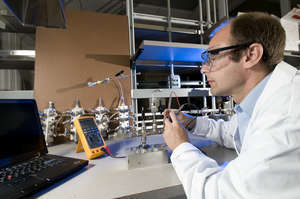Horizon 2020 - Nanotechnologies, draft work programme 2016-2017

The European Commission published the draft work programme 2016-2017 for Nanotech, Advanced Materials and Biotech in Horizon 2020
The Work Programme concerns different sectors:
- Nanotechnologies,
- Advanced Materials,
- Biotechnology,
- Advanced Manufacturing and Processing.
Between 2016 and 2017, two calls for proposals will be launched:
1. Call for Energy efficiency building
- EEB-01-2016: Highly efficient insulation materials with improved properties
- EEB-02-2016: Performance indicators and monitoring techniques for energy-efficiency and environmental quality at building and district level
- EEB-03-2016: Integration of advanced technologies for heating and cooling at building and district level
- EEB-04-2016: New technologies and strategies for the development of pre-fabricated elements through the reuse and recycling of construction materials and structures
- EEB-05-2017: Development of near zero energy building renovation
- EEB-06-2017: Highly efficient hybrid storage solutions for power and heat in residential buildings and district areas, balancing the supply and demand conditions
- EEB-07-2017: Integration of energy harvesting at building and district level
- EEB-08-2017: New business models for energy-efficient buildings through adaptable refurbishment solutions
2. Call for Nanotechnologies, Advanced Materials, Biotechnology and Production
2.1 ADVANCED MATERIALS AND NANOTECHNOLOGIES FOR HIGH ADDED VALUE PRODUCTS AND PROCESS INDUSTRIES
- NMBP-01-2016: Novel hybrid materials for heterogeneous catalysis
- NMBP-02-2016: Advanced Materials for Power Electronics based on wide bandgap semiconductor devices technology
- NMBP-03-2016: Innovative and sustainable materials solutions for the substitution of critical raw materials in the electric power system
- NMBP-04-2017: Architectured /Advanced material concepts for intelligent bulk material structures
- NMBP-05-2017: Advanced materials and innovative design for improved functionality and aesthetics in high added value consumer goods
- NMBP-06-2017: Improved material durability in buildings and infrastructures, including offshore
- NMBP-07-2017: Systems of materials characterisation for model, product and process optimisation
2.2 GREEN VEHICLES
- NMBP-08-2016: Affordable weight reduction of high-volume vehicles and components taking into account the entire life-cycle
2.3 ADVANCED MATERIALS AND NANOTECHNOLOGIES FOR HEALTHCARE
- NMBP-09-2016: Biomaterials for diagnosis and treatment of demyelination disorders of the Central Nervous System
- NMBP-10-2016: Nanoformulation of biologicals
- NMBP-11-2016: ERA-NET on Nanomedicine
- NMBP-12-2017: Development of a reliable methodology for better risk management of engineered biomaterials in Advanced Therapy Medicinal Products and/or Medical Devices
- NMBP-13-2017: Cross-cutting KETs for diagnostics at the point-of-care
- NMBP-14-2017: Regulatory Science Framework for assessment of risk benefit ratio of Nanomedicines and Biomaterials
- NMBP-15-2017: Nanotechnologies for imaging cellular transplants and regenerative processes in vivo
- NMBP-16-2017: Mobilising the European nano-biomedical ecosystem
2.4 ADVANCED MATERIALS AND NANOTECHNOLOGIES FOR ENERGY APPLICATIONS
- NMBP-17-2016: Advanced materials solutions and architectures for high efficiency solar energy harvesting
- NMBP-18-2016: Advanced materials enabling the integration of storage technologies in the electricity grid
- NMBP-19-2017: Cost-effective materials for “power-to-chemical” technologies
- NMBP-20-2017: High-performance materials for optimizing carbon dioxide capture
2.5 ECO-DESIGN AND NEW SUSTAINABLE BUSINESS MODELS
- NMBP-21-2016: ERA-NET on manufacturing technologies supporting industry and particularly SMEs in the global competition
- NMBP-22-2017: Business models and industrial strategies supporting novel supply chains for innovative product-services
2.6 BIOTECHNOLOGY
- BIOTEC-01-2016: ERA-NET Cofund on Biotechnologies
- BIOTEC-02-2016: Bioconversion of non-agricultural waste into biomolecules for industrial applications
- BIOTEC-03-2016: Microbial chassis platforms with optimized metabolic pathways for industrial innovations through systems biology
- BIOTEC-04-2016: KET Biotechnology foresight identifying gaps and high-value opportunities for the EU industry
- BIOTEC-05-2017: Microbial platforms for CO2-reuse processes in the low-carbon economy
- BIOTEC-06-2017: Optimisation of biocatalysis and downstream processing for the sustainable production of high value-added platform chemicals
- BIOTEC-07-2017: New Plant Breeding Techniques (NPBT) in molecular farming: Multipurpose crops for industrial bioproducts
- BIOTEC-08-2017: Support for enhancing and demonstrating the impact of KET Biotechnology projects
2.7 MODELLING FOR THE DEVELOPMENT OF NANOTECHNOLOGIES AND ADVANCED MATERIALS
- NMBP-23-2016: Advancing the integration of Materials Modelling in Business Processes to enhance effective industrial decision making and increase competitiveness
- NMBP-24-2016: Network to capitalise on strong European position in materials modelling and to allow industry to reap the benefits
- NMBP-25-2017: Next generation system integrating tangible and intangible materials model components to support innovation in industry
2.8 SCIENCE-BASED RISK ASSESSMENT AND MANAGEMENT OF NANOTECHNOLOGIES, ADVANCED MATERIALS AND BIOTECHNOLOGIES
- NMBP-26-2016: Analytical techniques and tools in support of nanomaterial risk assessment
- NMBP-27-2016: Promoting safe innovation through global consolidation and networking of nanosafety centres and strengthening the European industry through cooperation in nanosafety
- NMBP-28-2017: Framework and strategies for nanomaterial characterisation, classification, grouping and read-across for risk analysis
- NMBP-29-2017: Advanced and realistic models and assays for nanomaterial hazard assessment
2.9 INNOVATIVE AND RESPONSIBLE GOVERNANCE OF NEW AND CONVERGING ENABLING TECHNOLOGIES
- NMBP-30-2016: Facilitating knowledge management, networking and coordination in the field of formulated products
- NMBP-31-2016: Presidency events
- NMBP-31-2017: Presidency events
- NMBP-32-2016: Support for National Contact Points
- NMBP-33-2016: Networking and sharing best experiences in using regional clusters strategies with a focus on supporting innovation in the NMBP thematic area
- NMBP-34-2017: Governing innovation of nanotechnology through enhanced societal engagement
- NMBP-35-2017: Innovative solutions for the conservation of 20th century cultural heritage
- NMBP-36-2016: Policy support for Industry 2020 in the circular economy .
The work programme foresees also other actions, such as:
- cross-cutting actions,
- Fast track to innovation pilot,
- SME instrument,
- Blue Growth,
- external experts.
A novelty in Horizon 2020 is the Pilot on Open Research Data which aims to improve and maximise access to and re-use of research data generated by projects. Projects funded under topics NMBP-23 to NMBP-29 inclusive, on modelling and nanotechnology safety, will by default participate in the Pilot on Open Research Data in Horizon 2020.
The provisional budget of the work programme is 1,077 million of euros (516 million of euros for 2016, 562 million of euros for 2017). The adoption and the publication of the work programme by the Commission are expected in mid-October 2015.
Links
Draft work programme 2016-2017
Photo credit: glbrc.communications / Foter / CC BY-NC-ND




